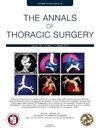胸外科医师学会术前β受体阻滞剂工作组中期报告。
IF 3.6
2区 医学
Q1 CARDIAC & CARDIOVASCULAR SYSTEMS
引用次数: 0
摘要
背景:心房颤动(AF)通常发生在心脏手术后,与多种不良预后有关。较早的随机试验表明,围术期使用β受体阻滞剂可减少术后房颤,胸外科医师协会(STS)的 CABG 综合衡量标准包括术前 24 小时内和出院时使用β受体阻滞剂。然而,最近的一些研究表明,术前使用β受体阻滞剂的价值有限,因此质疑是否继续将其作为 STS 质量衡量标准:2022 年,由 STS 和心血管麻醉医师协会的代表组成了 STS 术前β受体阻滞剂工作组。对已发表的随机试验、观察性研究、社会指南以及来自 STS 成人心脏手术数据库(ACSD)的可用数据现状进行了回顾:结果:对现有研究的审查显示,在使用的特定β受体阻滞剂、起始时间、慢性β受体阻滞患者的管理以及是否同时使用其他促心律失常或抗心律失常药物等方面存在很大的异质性或不够详细。此外,STS ACSD目前收集的β受体阻滞剂数据不够详细:结论:由于新的随机试验似乎不太可能进行,因此工作组认为,有关真实世界实践的更详细数据将有助于评估术前β受体阻滞剂在当前时代的价值、制定最佳实践建议以及评估其作为 STS 质量指标的持续适当性。STS ACSD 参与者已被邀请参加一项自愿调查,该调查的附加数据与 STS ACSD 记录相连后,将能更好地描述当代的β受体阻滞剂实践和结果。本文章由计算机程序翻译,如有差异,请以英文原文为准。
The Society of Thoracic Surgeons Preoperative Beta Blocker Working Group Interim Report
Background
Atrial fibrillation (AF) occurs commonly after cardiac surgery and is associated with multiple adverse outcomes. Older randomized trials suggested that perioperative β- blockade reduced postoperative AF, and The Society of Thoracic Surgeons (STS) coronary artery bypass grafting (CABG) composite measure includes β-blocker administration preoperatively within 24 hours of surgery and at discharge. However, some more recent studies suggest preoperative β-blockade has limited value and question its continuation as an STS quality measure.
Methods
In 2022, an STS Preoperative Beta Blocker Working Group was formed with representatives from the STS and the Society of Cardiovascular Anesthesiologists. Published randomized trials, observational studies, societal guidelines, and the current state of available data from the STS Adult Cardiac Surgery Database (ACSD) were reviewed.
Results
Review of existing studies reveals substantial heterogeneity or insufficient detail regarding specific β-blockers used, timing of initiation, management of patients on chronic β-blockade, and whether other proarrhythmic or antiarrhythmic drugs were used concurrently. Further, β-blocker data currently collected in the STS ACSD lack sufficient granularity.
Conclusions
Because a new randomized trial seems unlikely, the Working Group believes that more granular data on real-world practice would facilitate assessment of the value of preoperative β-blockade in the current era, development of best practice recommendations, and evaluation of their continued appropriateness as an STS quality metric. STS ACSD participants have been invited to participate in a voluntary survey whose additional data, when linked to STS ACSD records, will better delineate contemporary β-blocker practice and outcomes.
求助全文
通过发布文献求助,成功后即可免费获取论文全文。
去求助
来源期刊

Annals of Thoracic Surgery
医学-呼吸系统
CiteScore
6.40
自引率
13.00%
发文量
1235
审稿时长
42 days
期刊介绍:
The mission of The Annals of Thoracic Surgery is to promote scholarship in cardiothoracic surgery patient care, clinical practice, research, education, and policy. As the official journal of two of the largest American associations in its specialty, this leading monthly enjoys outstanding editorial leadership and maintains rigorous selection standards.
The Annals of Thoracic Surgery features:
• Full-length original articles on clinical advances, current surgical methods, and controversial topics and techniques
• New Technology articles
• Case reports
• "How-to-do-it" features
• Reviews of current literature
• Supplements on symposia
• Commentary pieces and correspondence
• CME
• Online-only case reports, "how-to-do-its", and images in cardiothoracic surgery.
An authoritative, clinically oriented, comprehensive resource, The Annals of Thoracic Surgery is committed to providing a place for all thoracic surgeons to relate experiences which will help improve patient care.
 求助内容:
求助内容: 应助结果提醒方式:
应助结果提醒方式:


